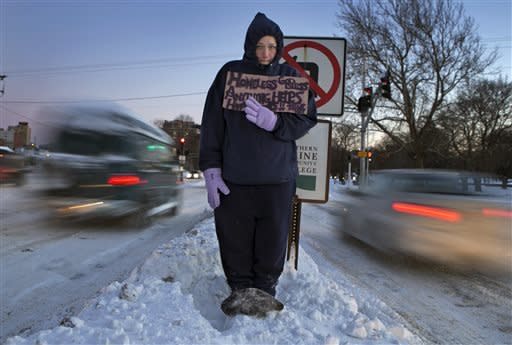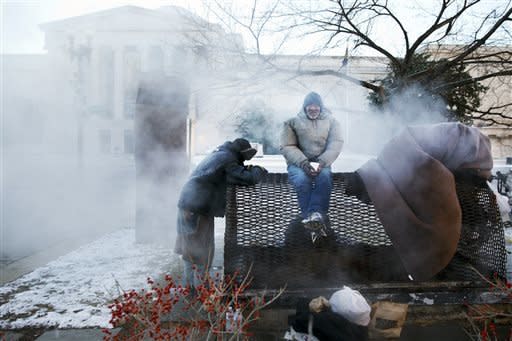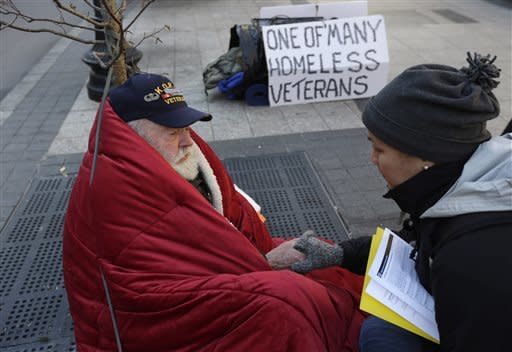Dunkin' Donuts Fires Worker Who Poured Water On Homeless Man In Viral Video
Two employees at a Dunkin’ Donuts franchise in Syracuse, New York, have been fired after a viral video showed one of them pouring water on a homeless man.
Jeremy Dufresne was at the restaurant Sunday night when an unnamed employee came up from behind and dumped water on him, according to the New York Daily News.
“How many times I’ve got to tell you to stop sleeping in here?” the employee tells Dufresne in the video. “You’re here all day.”
Both employees can be heard laughing in the video, which was posted on Facebook and has been viewed more than 3 million times.
Dufresne, who is schizophrenic and sleeps outside most nights, told Syracuse.com he was charging his phone at the Dunkin’ so he could call his mom to tell her goodnight.
At some point, he put his head down, and that’s when the employee dumped the water on him.
“He probably had some personal problems of his own and needed someone to talk to,” Dufresne said of the worker. “And he took it out on someone else, like me.”
After the video went viral, two dozen protesters gathered outside the doughnut shop on Monday and held up signs reading “Homeless lives matter” and “Homeless are human,” according to Syracuse.com.
Dunkin’ franchisee Kimberly Wolak issued a statement condemning the employees who did it:
“Dunkin’ has been a part of the Syracuse community for many years, and as the franchisees who own and operate the North Salina Street location, we were extremely disturbed by the behavior of our employees captured in the video.
“It not only violated our written policies, but goes against our core values as an organization―which include creating a welcoming and hospitable environment and treating everyone with dignity and respect. The employees involved in the incident have been terminated, and we will be contacting the individual in the video to apologize for the negative experience.
“We also intend to work with local advocates to make sure that our employees are better educated as to how to engage with homeless individuals and where to direct them in the community for appropriate assistance.”
In addition, owners are hoping to make amends to the area’s homeless population by serving lunch to them on Saturday, according to Syracuse.com.
Onondaga County District Attorney William Fitzpatrick told Syracuse.com his office is considering charging the now-former employees with harassment, which carries about the same fine as a speeding ticket.
HuffPost reached out to Dunkin’ corporate offices, which did not immediately respond.
A GoFundMe campaign organized on behalf of Dufresne has raised nearly $15,000.
Also on HuffPost
Help find shelter for homeless individuals

If, however, you don't have this information handy, or if you are unwilling, for whatever reason, to personally approach the person in question, then you should consider calling a local crisis hotline (Forbes has a partial list of numbers you could call) or 911.
(In the photo above, 28-year-old Victoria Morris is pictured panhandling in Portland, Maine, where the temperature at dusk was 7 degrees Fahrenheit on Friday. Morris, who is homeless, finally sought shelter when she could no longer feel her toes, the AP reports.)
Offer blankets, clothes, hot food

But keep this in mind: Even if you have the best of intentions, Stoops recommends that you use tact when approaching someone who you think is homeless.
"There's a lot of shame involved in being homeless," he said, so avoid making assumptions or asking personal questions.
Instead, Stoops says that you should consider following these steps: "If I have a blanket or a pair of socks or something, what I'll generally do is I'll introduce myself before asking for their name. Then rather than ask if they're homeless, I'll ask them: 'Where did you sleep last night?' I'll then ask the person if he or someone he knows could use the blanket I have."
Even if you don't have an extra blanket on hand or warm clothing to spare, there's still something you can do. An act of kindness can lift spirits, Stoops says, and can be just as useful on a cold, dark night.
"Our homeless friends have told us that oftentimes, simple conversation or just being treated nicely, with dignity and respect, is as important as getting something tangible," he said.
(In the photo above, four homeless men are pictured warming themselves on a steam grate by the Federal Trade Commission, blocks from the Capitol, during frigid temperatures in Washington, Saturday, Jan. 4.)
Help tackle the root causes of homelessness

"We shelter people when it gets really, really cold," Stoops said. "But it should be a year-round thing. I wish Americans would think of homeless people during the warmer months... We can lose as many people during the warmer months than the winter."
Some parts of the U.S. can get dangerously hot during the summer months, which can put vulnerable communities at considerable risk of a whole slew of heat-related health problems, including heat stroke and dehydration.
According to Stoops, volunteering also spikes during the holiday season and is not "consistent" through the year.
"Around Thanksgiving and Christmas, there are so many volunteers that sometimes we have to turn them away," Stoops said. "But if I ask them if I can sign them up for a shift in the soup kitchen on Feb. 15 or Aug. 1, they get very quiet. Very few people can think about homelessness throughout the year but I'd encourage people to be consistent and to volunteer on a regular basis."
Experts say that while short-term help is crucial and cannot be overlooked, fighting homelessness is a long-term process.
"Giving out blankets and sandwiches" is great, Stoops said, but to tackle homelessness in a holistic way, we also need to think about "attacking the root causes of poverty."
For instance, "we need to focus…on increasing minimum wage, making housing affordable, improving health care and pushing public officials and religious leaders to tackle inequality and poverty," he said.
(In the Nov. 20, 2013, photo above, homeless Korean War veteran Thomas Moore, 79, left, speaks with Boston Health Care for the Homeless street team outreach coordinator Romeena Lee on a sidewalk in Boston.)
Love HuffPost? Become a founding member of HuffPost Plus today.
This article originally appeared on HuffPost.

